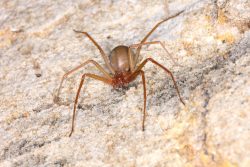Are The Brown Recluse Spider Poisonous To Humans?
May 17, 2023 2:35 pm Leave your thoughts Are The Brown Recluse Spider Poisonous To Humans?
Are The Brown Recluse Spider Poisonous To Humans?
The Brown Recluse Spider is a common species of spider found in different parts of the United States. These spiders are known for their habit of living in dark, warm places such as attics, basements, sheds, and closets, among others.
However, many people have heard about the bite of the Brown Recluse Spider and how it can be dangerous to humans. In this article, we will discuss everything you need to know about the Brown Recluse Spider, including its behavior and whether it is poisonous to humans.
Behavior Of Brown Recluse Spiders
The Brown Recluse Spider gets its name from its habit of living in secluded and hidden places. They are usually small in size, ranging from 6mm to 20mm in length, and have a brownish color. They have a distinctive, violin-shaped mark on their cephalothorax, which is the body part that contains the head and thorax.
These spiders typically hunt at night and feed on small insects like crickets, cockroaches, and moths. They are not aggressive and, as their name suggests, will tend to avoid contact with humans, preferring to hide in dark crevices. However, the Brown Recluse Spider may bite if it feels threatened, such as when it gets squeezed or disturbed by an external force.
How Brown Recluse Spider Bites Look Like
If you get bitten by the brown recluse spider, it can be a painful experience. The bite is usually painless at first, but the pain starts to intensify after a few hours. The bite may become red and swollen, and a blister may form around the area of the bite.
In some cases, the bite may become necrotic, which means that the skin tissue around the bite dies and starts to peel off. The necrotic bite can leave a deep and permanent scar on the skin, and in severe case, can lead to amputation.
Are Brown Recluse Spiders Poisonous?
The Brown Recluse Spider is one of the poisonous spiders found in North America. The venom of the Brown Recluse Spider contains a compound called sphingomyelinase D, which can cause tissue damage and necrosis around the bite area. In severe cases, the venom can also cause kidney damage and other systemic effects.
It is worth noting that not all Brown Recluse Spider bites are poisonous. In some cases, the venom may not be injected or the spider may not have enough venom to cause harm. However, if you are bitten by a Brown Recluse Spider, it is essential to seek medical attention immediately, particularly if the area around the bite becomes red, swollen, or necrotic.
How To Prevent Brown Recluse Spider Bites
Because the Brown Recluse Spider prefers dark, secluded areas, it is crucial to take preventive measures to reduce the chances of getting bitten. Here are some tips to prevent brown recluse spider bites:
1. Keep your home clean and clutter-free: Brown recluse spiders like to hide in cluttered areas and piles of clothing, so it’s important to keep your home clean and well-organized.
2. Seal cracks and crevices: Inspect your home for cracks and crevices in the walls, windows, and doors. Seal them with caulking or weather stripping to prevent spiders from crawling into your home.
3. Use spider repellents: There are several commercial spider repellents available in the market that can help keep brown recluse spiders away from your home. Alternatively, you can use essential oils like peppermint, eucalyptus, or lavender to repel spiders.
4. Wear protective clothing: If you plan to go into areas where brown recluse spiders are likely to be present, wear long-sleeved shirts, pants, and shoes to protect yourself from bites.
5. Consult a professional pest control company: If you’ve had brown recluse spider sightings in your home, it may be wise to consult with a professional pest control company to help eliminate the infestation.
Final Thoughts
In summary, the Brown Recluse Spider is poisonous to humans and can cause severe tissue damage and necrosis around the area of the bite. However, not all Brown Recluse Spider bites are poisonous, and in some cases, the venom may cause only mild symptoms.
To prevent brown recluse spider bites, it is vital to keep your home clean and well-organized, seal cracks and crevices, use spider repellents, wear protective clothing, and consult a professional pest control company if needed.
If you get bitten by a Brown Recluse Spider, seek medical attention immediately, particularly if the bite area becomes red, swollen, or necrotic. With proper precautions, you can reduce the chances of getting bitten by a Brown Recluse Spider and minimize the potential risks associated with it.
Categorised in: Insect Control, Questions & Answers
This post was written by Ken Perry

 Are The Brown Recluse Spider Poisonous To Humans?
Are The Brown Recluse Spider Poisonous To Humans?